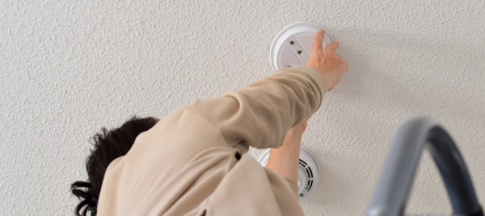
Whether you’re a full-time landlord or you rent out a buy-to-let property on the side, there are certain responsibilities you must legally meet.
What is buy-to-let?
Buy-to-let means that you purchase a property with the intention of renting it out. There are special buy-to-let mortgages available for this purpose, usually interest-only.
Tenancy Agreements
A clearly worded document can provide clarity and help avoid disputes. It isn’t a legal requirement.
Even if you don’t provide a tenancy agreement, there are responsibilities you have which are given by law, even if they haven't been specifically agreed between you and your tenants.
You’re not obliged to renew a fixed-term tenancy agreement once it ends. The tenancy can become a periodic tenancy and will continue with the same terms and conditions as before.
You or the tenant can also decide not to continue the tenancy.
What are landlords responsible for?
Legally, all landlords in England must:
- keep the property safe, making sure it presents no risk to health
- take care of the installation and maintenance of gas and electrical equipment
- install a smoke alarm on at least every floor of the building
- install a carbon monoxide alarm in every room where there’s a fixed combustion appliance (e.g. gas boilers or log burners)
- make sure the property has an Energy Performance Certificate
- put their tenant’s deposit in a government-approved protection scheme
- carry out a right to rent check on their tenants
- provide their tenants with a copy of the How to Rent checklist when they start their tenancy
Safety regulations
There are three areas that need regular safety checks at least once every year:
Electrical safety
Lights, sockets and any electrical items provided in the property need to be installed properly, maintained regularly and declared safe to use.
At a minimum, you should carry out a visual inspection in between tenancies. While it’s not compulsory, it’s a good idea to do an Installation Survey and have Portable Appliance Testing (PAT) done every year.
Gas safety
You’ll need a gas safety check every year from a qualified Gas Safe registered engineer – basically making sure that all gas appliances, pipes and flues are safe and working properly.
Make sure you get a copy of the gas safety record, as you’ll need to give it to your tenants within 28 days of the check being carried out.
Fire safety
Periodical fire risk assessments are a legal requirement for houses of mixed occupation – but it’s a good idea to carry one out every two years and update it every four years, whatever the property type.
The minimum fire safety responsibilities for landlords are:
- a smoke alarm must be installed and tested on every floor of the property
- a carbon monoxide alarm needs to be in any room that has an appliance that burns fuel, like a wood burner
- any furniture and furnishings you provide in the property must meet fire safety standards and be appropriately labelled
- make sure that your tenants have access to safe and reliable escape routes at all times
- provide fire alarms and extinguishers if the property is a house in multiple occupation
Legionella Risk Assessment
All landlords must assess their properties for Legionella bacteria, as it can cause the potentially fatal Legionnaires’ disease if given the right conditions to grow in water systems.
For most domestic properties, the risk assessment a simple process that can be handled independently.
Repairs and maintenance
When it comes to repairing and keeping things in working order at the property, as the landlord you’re responsible for:
- making sure the structure and outside of the property are in good condition – things like the walls, roof, foundations, drains, guttering and external pipes, windows and external doors
- basins, sinks, baths, toilets and their pipework
- maintaining water and heating systems – including water and gas pipes, electrical wiring, water tanks, boilers, radiators, gas fires, fitted electric fires or fitted heaters
- pest control, if it’s caused by a repair that you need to fix, or if pests were there when the tenancy began
Your property could be deemed unfit for human habitation if:
- it has a serious damp or mould problem
- the temperature is much too hot or cold
- too many people live there
- there’s a pest infestation
- there’s no safe water supply
Energy Performance Certificate
An Energy Performance Certificate (EPC) has been a legal requirement for private rental properties in England and Wales since 2018.
An EPC is carried out by an accredited domestic energy assessor and gives the property an energy efficiency rating from A (most efficient) to G (least efficient) and is valid for 10 years.
Any landlord who privately rents out property in England and Wales must make sure that the house or flat being rented has a minimum energy efficiency rating of E.
That way, tenants are protected from spending huge amounts running their homes, as well as reducing greenhouse gas emissions and evening out seasonal peaks in energy demand.
If your property has a rating below E, you won’t be able to rent it out.
Your assessment will give you advice about how to make your home more energy efficient – follow these, and you’ll increase your likelihood of meeting the minimum standard.
Tenancy Deposit Protection
Most landlords ask their tenants to pay a deposit before moving in. It covers any unexpected damage to the property and furniture during the tenancy.
All tenancy deposits need to be protected via one of three government-approved deposit protection schemes within 30 days of receiving it: The Deposit Protection Service, MyDeposits or The Tenancy Deposit Scheme.
These services make sure tenants get their deposit back, as long as they leave your property undamaged, pay their rent and bills and meet the other terms of your tenancy agreement.
At the end of the tenancy, you’ll need to return the tenants’ deposit within 10 days of agreeing the amount owed. Any disputes can be handled by your chosen deposit protection provider.
Right to Rent Checks
Checking that all tenants in a rented property have a legal right to live in the country is a landlord’s responsibility (although currently this only applies in England).
It’s called a right to rent check and must take place at the beginning of every new tenancy agreement.
You can carry out a right to rent check yourself, but the Home Office recommends using a certified Digital Identity Service Provider (IDSP) to make sure you’re meeting the relevant guidance standards consistently and securely.
Houses of Multiple Occupancy (HMO) License
A home with three or more unrelated tenants, where toilets, bathrooms and kitchen facilities are shared, is considered a house in multiple occupation (HMO).
If there are five or more unrelated tenants in a home with shared toilet, bathroom and kitchen facilities, it’s considered a large HMO.
Landlord legal responsibilities state that large HMOs require a licence. In some areas, smaller HMOs also need a licence – if you’re not sure if this applies to you, check with your local council.
Renting out an unlicensed HMO is punishable by an unlimited fine, so it’s important to get this right.
Penalties
If you don’t meet all your responsibilities as a landlord, you could face a penalty in some circumstances.
You could go to prison or face a fine if you:
- rent a property in England to someone you know has (or had) ‘reasonable cause to believe’ they couldn’t legally rent in the UK
- harass tenants
- illegally evict a tent
You could face a fine if you:
- don’t obtain proper licenses and permits
- don’t meet fitness for habitation standards
- breach safety certification
- breach the Tenancy Fees Act
- don’t protect a tenant’s deposit
What is the Renting Homes (Wales) Act?
In December 2022, the Renting Homes (Wales) Act 2016 changed the way all landlords in Wales let their properties.
For landlords, this means:
- simpler contracts: ‘Secure’ for the social rented sector and ‘Standard’ for the private rented sector
- making sure homes are fit for human habitation (FFHH), including electrical safety testing, smoke alarms and carbon monoxide detectors
- abandoned properties can be repossessed without needing a court order



